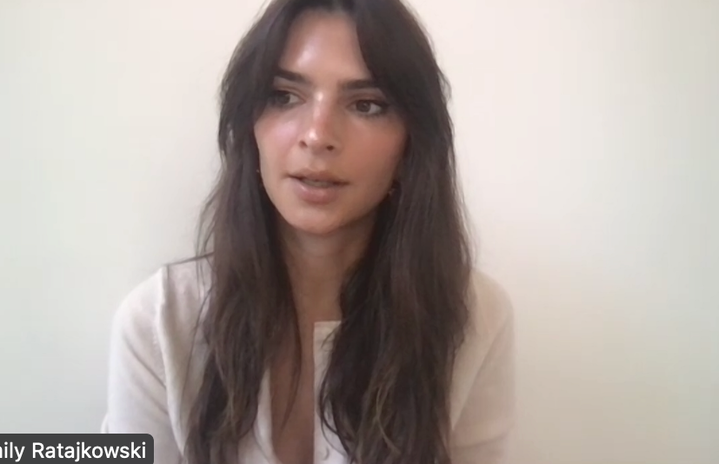Emily Ratajkowski, acclaimed model and actress, released her debut novel, My Body, in October of 2021. My Body immediately became a New York Times bestseller and was described as the “Most Anticipated” and “Best of Fall 2021” book for Vogue, Time, Esquire, People and USA TODAY. Ratajkowski first showcased her writing skills in 2020 when she published “Buying Myself Back”, one of the many essays included in her novel. This topic of reclaiming agency over herself while working as a model is central in her book.
On Oct. 7, Her Campus Media held a press conference with Ratajkowski about My Body, led by Allison Piwowarski. Staff writers Tara and Isabelle convened after to discuss body image, the modeling industry, women’s emotions and Ratajkowski’s honest insight.
This is their conversation, edited for length and clarity.
Content warning: This article mentions sexual assault and eating disorders. Reader discretion is advised.
Isabelle: There are two things that I want to frame my viewpoint with. First, I really enjoyed her book, I found it captivating and well-written. Second, when I first heard of Emily Ratajkowski, I was in middle school, and it was through those Pinterest boards of super skinny models and they would be your “thinspiration”. She tended to be the star of these Pinterest boards. So it’s really hard for me not to see her through that lens, just because that’s how I’ve understood her for so long. I realize that’s unfair to her in so many ways, so I was excited to read her book and get to know her more as a person. I felt that in the press conference, there was a veneration of her, very much shying away from anything remotely critical. And I don’t think that we should worship celebrities. At the end of the day, they are humans who are participating in toxic industries, even though they didn’t invent them, and she’s been both a victim and a perpetrator in many ways. I think it’s really important to be critical of everybody in the media.
Tara: She does perpetrate dangerous body ideals in the book. We can see this when she’s talking about the “Blurred Lines” music video, how she didn’t eat to make sure her body looked more toned. The book centers around her reclaiming her body and fighting against the patriarchal ideals in the fashion industry. And yet she’s still upholding those ideals by promoting them. However, I feel like it’s possible that there could be some internalized misogyny in what I’m saying since I do compare myself to her. There was a TikTok that I saw earlier today where some girl said that before she goes on a date, she looks at who he follows—
Isabelle: I do that.
Tara: And if he follows Emily Ratajkowski, she cancels the date. Because she feels like it’s such an unattainable body ideal.
Isabelle: I do the same thing. If I see that a guy I’m interested in follows Emily Ratajkowski, I feel sick. Which maybe isn’t fair, but it feels like every single one of her features caters to the “perfect” aesthetic of what we want right now. It’s just that whole idea of constantly feeling like we compete with other girls. I look the way I look and I’m good with that. But it’s frustrating to know that other people, especially guys, are going to have expectations because of this image she’s perpetuating.
Tara: It’s interesting to see how she compared herself to women and pointed out her “inadequacies” [in the book]. She doesn’t see herself as this beauty ideal.
Isabelle: She is now held up as a sex symbol, and that’s such a big thing to put on a human being, you know? She writes about how she dissociates from her body and doesn’t really know what she looks like and is constantly looking at her body through the lens of how other people are seeing it.
Tara: In one of the early quotes in the book, she says: “All women are objectified and sexualized to some degree, I figured. So I might as well do it on my own terms.” She [later] says that she missed the complicated picture — that this is a reward for capitalizing on her sexualized body. She understands this is problematic but at the same time questions if she would even be able to publish this book without those opportunities.
All women are objectified and sexualized to some degree, I figured. So I might as well do it on my own terms.
My Body by Emily Ratajkowski
Isabelle: Even the concept of a famous model writing a book — she says that she really wants to show that she has a brain, that she has feelings, that she’s not just —
Together: A body.
Tara: However, she does highlight in the book that she’s always wanted to create something of her own, she loves writing. So I definitely think this was a cathartic experience. I do feel like a lot of memoirs themselves are self-serving, in a sense.
Isabelle: True. But the whole point of a memoir is, okay, this is about me, but I know that other people will gain something from hearing it. In the press conference, she was giving us big-sisterly advice like, “Don’t be so f*cking hard on yourself!”. Here’s this woman who’s succeeded in so many ways, you always want to know, what can I learn from her? But it’s frustrating to me that even though she’s all about connecting with women and supporting women, it feels like there’s not really a lot of that between her and her readers. She didn’t offer any recognition or remorse for her perpetuation of these dangerous beauty standards. Like at the beginning of the book, she says her career really took off when she got the stomach flu and lost X pounds in X days. I kept waiting for her to get deeper into those ideas of how this industry encourages disordered eating, and it just never came. It felt like there were certain things that she was very conscious not to talk about.
Tara: In the press conference, she said, “The fashion industry and modeling, fundamentally what it does is problematic. So I don’t care how many representations — whatever representation you have, racially, bodily, whatever, you’re still creating a beauty standard”. I feel like that sentiment itself has some privilege in it because whenever you have a bigger-bodied person “as representation” — which they never really are — they will never be viewed in the same way that Emily Ratajkowski is. European ideals surrounding thinness and beauty have been and probably will continue to be the body ideals.
“I’m hoping I won’t be working in [the industry] forever.”
Emily Ratajkowski, press conference 10/7/22.
Isabelle: I want to get more into the quote that you brought up. She then said, “So when people talk about reforming the industry, there’s a lot that could be done to protect the young women that work in [it], but I think that the way that I would be able to really change it would be just not to participate at all…I’m a single mom and I want to work, but I’m hoping that I won’t be working in it forever.” And then in the chapter “Bc Hello Halle Berry”, she’s on this paid-for vacation for work, and she says “The whole damn system is corrupt and anyone who participates is just as guilty as I am. What am I going to do? Go live off the grid? I have to make a living somehow.” She talks a lot about how she grew up poor and how it was really important for her to hustle and be able to take care of herself and her family, and I respect that. What’s frustrating for me is that it’s now been over a decade and she’s made her money and built this empire — isn’t it time to use that money to make a change? But also, can you reform something that is fundamentally—
Tara: Broken?
Isabelle: Broken, yeah. Maybe you can, maybe you can’t. But it seems like she just gave up. And I don’t think that’s quite right. Something she told us is that models don’t have a union — which is insane! There are all these young girls that are working in this really difficult and historically exploitative industry and there’s no protection for them. So, I would love to see her do something in terms of unionizing in the industry.
Tara: I specifically wanted to highlight the sexual assaults in the book. In nearly every career-changing shoot or music video that she was involved with, she was sexually assaulted or harassed on set. And to hear that her first sexual experience was through rape… I think [it] is something that she buried over time.
It wasn’t just therapeutic…it was kind of like BDSM.
Emily Ratajkowski, press conference 10/7/22.
Isabelle: Somebody asked, in the press conference, about her experience writing about things that are so vulnerable and triggering. She said, “It wasn’t just therapeutic, relaxing, whatever. It was partly me being like, you should’ve done things differently and you’re gonna write this and you’re gonna see…it was kind of like BDSM. I was trying to beat myself up.”
Tara: I did definitely feel like there was a tone of self-blame in a lot of it. Specifically in the “Men Like You” chapter with Steven. It made me almost want to grab her and say “don’t say this about yourself”.
Isabelle: I think there’s a feeling that there’s the right and proper way to write about these things, the way your therapist would want you to do it, in terms of like, “it wasn’t my fault, I was hurt.” This is all true, however, that’s not necessarily what your experience is. And I think that she was very honest.
Tara: She was very raw with it. In the last chapter, she says after she gives birth to her son, she writes that that’s the sense in which she’s finally able to reclaim herself. For me, that was the most powerful paragraph in the book.
Isabelle: One of the most powerful paragraphs for me, she’s talking about this boy who sexually assaulted her. And, side note, what was really interesting about that is I’m not sure that she explicitly says he raped her. She describes what happened, but I don’t think that she herself uses the word. It comes up later when her friend says—
Together: “That sounds like rape, Emily.”
Isabelle: But I don’t think she herself ever uses the word. This is also very honest — it’s so hard to admit that something that happened to you was not consensual, especially in a situation where he was her boyfriend. At the end of the chapter “My Son, Sun”, she finds out that he’s died of a drug overdose. She said, “I cried because I didn’t feel like the heroine of my own life. I cried because I was ashamed of being so incapable of control…I whispered into my palms…firmly: ‘Owen, no.’” You can tell writing that must have been such a release.
Tara: I had to take a break after that chapter.
Isabelle: Something that she said in a recent TikTok is that we love to fetishize female pain. And then in this press conference, she refers to the experience of writing about her assaults as “kind of like BDSM.” Even by using that phrase, she’s sexualizing her own pain. I think she’s saying, what happened wasn’t consensual, but the way she approached it, it hurts, but this time she’s saying that it’s on her terms. So I was like, damn, she really recontextualized this for herself. She also told us she hasn’t reread her book in a while. She said, “I re-experience and remember those pieces of the book by interacting with people who have recently read it, and what they relate to and what they want to talk about. That feels more rewarding than rereading the book itself.” That’s so beautiful because isn’t the whole point of telling your story knowing that somebody else is going to relate and be helped by it?
Tara: Yeah, definitely.
Isabelle: I think it’s also really interesting that we’re talking about all these nonconsensual situations where she was powerless. And we started our conversation by talking about the power that she has over us. It’s crazy that you can play both roles so much.
Tara: She says towards the end of the book, “No one likes an angry woman. She is the worst kind of villain…I try to make anything resembling anger seem spunky and charming and sexy. I fold it into something small, tuck it away.”
Isabelle: And in her recent TikTok where she talks about the new movie Blonde, she says, “You know what’s kind of hard to fetishize? Anger…I think we all need to be a little more pissed off.” I agree, but the reasoning doesn’t quite sit right with me. It’s like, we’re so aware of how men are perceiving us and how we wish we were perceived instead, that we’re changing our behavior. And I think we shouldn’t be doing that. But also at the end of the day, it’s a trap, and we’re probably always going to be doing it to some extent.
I think we all need to be a little more pissed off.
Emily Ratajkowski, TikTok 9/30/22.
Tara: I truly commend her for everything that she’s said. It’s so difficult to pull yourself literally out of the camera lens — from the way that other people are seeing you. The male gaze will always be something that affects all of us. Obviously, it affects her more because she built her career off of it. [But] why can’t we utilize our sadness? Why can’t we express our happiness, sadness, guilt, shame and anger? We shouldn’t have to choose how to portray ourselves in order to be taken seriously. We should be able to cry and be taken seriously. Anger is also a male-associated emotion, and it is taken more seriously in every way.
Isabelle: And I do think it’s really important for women to be angry. I’ve been angry a lot lately! It’s such a visceral emotion too. And so it all comes back to how you connect to your body. All in all, approaching this book as a memoir — I think it’s a great memoir. I just find it frustrating that in the press conference, when asked, she ultimately didn’t say that she was doing anything to change the trajectory of the industry. Which is honest, and I think that’s true in some ways. She said she doesn’t necessarily identify as an activist because she “meet[s] people whose whole lives are about political change, that’s not true for [her]”. Still, I’m a little surprised that she doesn’t feel more responsibility to help protect the women coming after her when she knows exactly what’s happening to them within the industry. And on the other hand — this is where my anger comes in — it is not her job to fix everything. She is one person.
Tara: That’s how I feel.
Isabelle: She shouldn’t have to fix the men of the world. But the sad truth is, I don’t know how else things are going to happen if it’s not women taking care of each other.
Tara: It’s really complicated because you expect her to also reframe the broken industry. However, is it her responsibility to do that? I think [this memoir] was just her way of proving, as she says, that she has a mind and not just a body.
Isabelle: I’m excited about her podcast because a book is a very specific way of telling a story, and I like that she wants to extend it into an ongoing conversation. I mean, that’s why you and I chose to sit down and talk about this instead of one person writing an article. At the same time, what comes of all this talking? I truly hope that if she’s not the one going out and forming model unions and making these concrete changes, I really hope that other people are inspired by all this and go out and do that because women deserve that.



